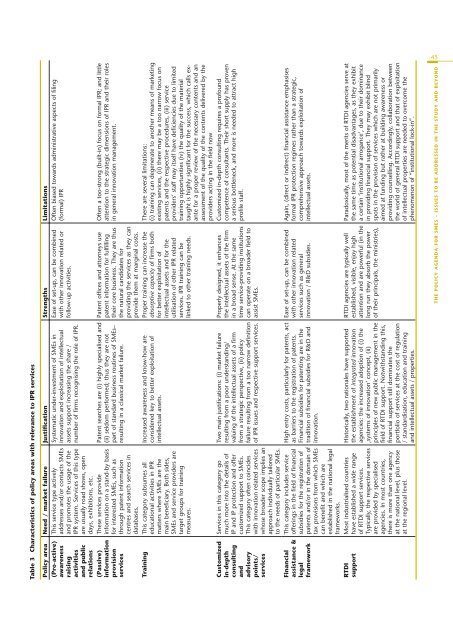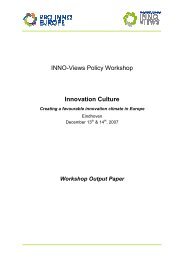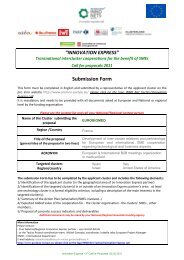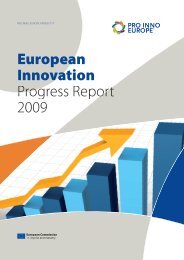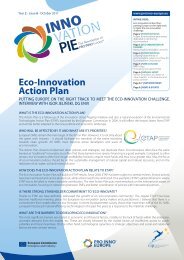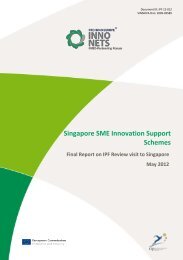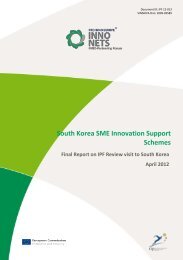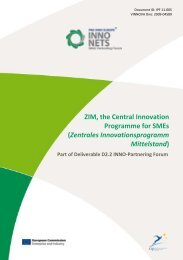Benchmarking National - PRO INNO Europe
Benchmarking National - PRO INNO Europe
Benchmarking National - PRO INNO Europe
Create successful ePaper yourself
Turn your PDF publications into a flip-book with our unique Google optimized e-Paper software.
Table 3 Characteristics of policy areas with relevance to IPR services<br />
Policy area Need / market failure Justification Strengths Limitations<br />
(Pro-active) This service type actively Systematic under-investment of SMEs in Ease of set-up, can be combined Often biased towards administrative aspects of filing<br />
awareness addresses and/or contacts SMEs innovation and exploitation of intellectual with other innovation related or (formal) IPR<br />
raising and promotes the usage of the assets support increasing the share / follow-up activities.<br />
activities IPR system. Services of this type number of firms recognising the role of IPR.<br />
and public are usually road shows, open<br />
relations days, exhibitions, etc.<br />
(Passive) These services provide<br />
Patent searches are (i) highly specialised and Patent offices and attorneys use Often a too-strong (built-in) focus on formal IPR; and little<br />
information information on a stand-by basis (ii) seldom performed; thus they are not patent information for fulfilling attention to the strategic dimensions of IPR and their roles<br />
provision for interested SMEs, such as part of standard business routines of SMEs– their core business. They are thus in general innovation management.<br />
services through patent information resulting in a classical market failure. the natural candidates for<br />
centres and search services in<br />
providing the services as they can<br />
databases.<br />
provide them at marginal costs.<br />
Training This category subsumes all Increased awareness and know-how are Proper training can increase the There are several limitations:<br />
educational activities in IPR considered key to better exploitation of absorptive capacity of firms both (i) training can degenerate to another means of marketing<br />
matters where SMEs are the intellectual assets.<br />
for better exploitation of<br />
existing services, (ii) there may be a too narrow focus on<br />
main beneficiary. Both sides,<br />
intellectual assets and for the patents and the respective procedures, (iii) service<br />
SMEs and service providers are<br />
utilisation of other IPR related providers’ staff may itself have deficiencies due to limited<br />
target groups for training<br />
services. IPR training can be training opportunities (iv) the quality of the material<br />
measures.<br />
linked to other training needs. taught is highly significant for the success, which calls exante<br />
for a proper review of the necessary contents and an<br />
assessment of the quality of the contents delivered by the<br />
providers acting in the field now<br />
Customized Services in this category go Two main justifications: (i) market failure Properly designed, it enhances Customized in-depth consulting requires a profound<br />
in-depth much more into the details of resulting from a poor understanding/ the intellectual assets of the firm competence of consultants. Their short supply has proven<br />
consulting IP and IP protection and offer valuing of the intellectual assets of a firm in a broad sense. At the same a serious bottleneck, and more is needed to attract high<br />
and<br />
customized support to SMEs. from a strategic perspective, (ii) policy time service-providing institutions profile staff.<br />
advisory This category often coincides failure resulting from a too narrow definition can operate on a broader field to<br />
points/ with innovation related services of IPR issues and respective support services. assist SMEs.<br />
services whose broader scope implies an<br />
approach individually tailored<br />
Again, (direct or indirect) financial assistance emphasises<br />
formal IPR protection regimes rather than a strategic,<br />
comprehensive approach towards exploitation of<br />
intellectual assets.<br />
Ease of set-up, can be combined<br />
with other innovation related<br />
services such as general<br />
innovation / R&D subsidies.<br />
High entry costs, particularly for patents, act<br />
as barriers to the registration of patents.<br />
Financial subsidies for patenting are in the<br />
tradition of financial subsidies for R&D and<br />
innovation.<br />
to the needs of particular SMEs.<br />
This category includes service<br />
offerings in the field of financial<br />
subsidies for the registration of<br />
patents and/or in the domain of<br />
tax provisions from which SMEs<br />
can benefit and which are<br />
established in the national legal<br />
frameworks.<br />
Most industrialised countries<br />
have established a wide range<br />
of RTDI support services.<br />
Typically, the respective services<br />
are provided by specialised<br />
agencies. In most countries,<br />
there is more than one agency<br />
at the national level, plus those<br />
at the regional level.<br />
Financial<br />
assistance &<br />
legal<br />
framework<br />
Paradoxically, most of the merits of RTDI agencies serve at<br />
the same time as potential disadvantages, as they exhibit<br />
a certain ‘institutional arrogance’, due to their dominance<br />
in providing financial support. They may exhibit blind<br />
spots in the provision of services which are not primarily<br />
aimed at funding but rather at building awareness or<br />
providing counselling. Accordingly, collaboration between<br />
the world of general RTDI support and that of exploitation<br />
of intellectual properties are needed to overcome the<br />
phenomenon of “institutional lock-in”.<br />
RTDI agencies are typically well<br />
established, visible, enjoy high<br />
attention and are powerful (in the<br />
long run they absorb the power<br />
of their principals, the ministries),<br />
Historically, two rationales have supported<br />
the establishment of integrated innovation<br />
agencies: the increased adoption of (i) the<br />
‚systems of innovation‘ concept, (ii)<br />
principles of new public management in the<br />
field of RTDI support. Notwithstanding this,<br />
financial support still dominates the<br />
portfolio of services at the cost of regulation<br />
/ standardisation, education and training<br />
and intellectual assets / properties.<br />
RTDI<br />
support<br />
45<br />
THE POLICY AGENDA FOR SMES – ISSUES TO BE ADDRESSED IN THE STUDY AND BEYOND


